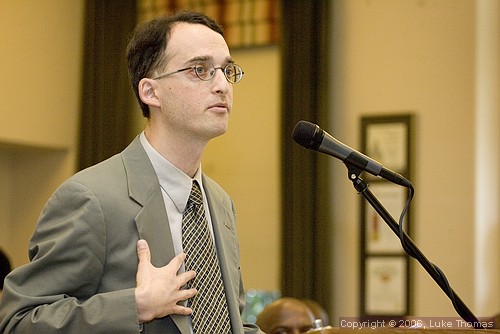The Challenge of Police Reform
All Eyes on Sacramento as SB 1019 Heads
to Assembly Public Safety Committee
By Mark Schlosberg,
Special to Fog City Journal
June 24, 2007
In August, 2006, the California Supreme Court decided the case
of Copley Press v. Superior Court, which resulted in disciplinary
proceedings regarding police misconduct complaints before the
San Francisco Police Commission - and other oversight agencies
throughout the state - being closed to the public.
On Tuesday the Assembly Public Safety Committee will hear SB
1019, which would overturn Copley Press and restore
public access. The police unions are mounting an extremely aggressive
fight to stop the bill's passage and constituent calls
for reform could make the difference in this bill passing,
where other statewide accountability efforts have failed.
The history of legislative efforts to promote accountability
in Sacramento is, in many ways, less a history in accountability
and more a history of the influence of the police association
lobby.
In 1978, four years after the California Supreme Court decision
in Pitchess
v. Superior Court, which mandated that the defense in
certain criminal cases be provided with information about citizen
complaints about involved police officers, the legislature looked
to manage the process. In the years following the Pitchess
case, some police departments shredded their complaint files,
rather than turn over the documents to the defense. The Los Angeles
Police Department, for example, shredded decades of files and
over 130 criminal cases were dismissed as a result of this misconduct.
The result: A "compromise" was struck whereby complaints
had to be held for five years, but they would be confidential.
While the intent of the statute was to apply to internal affairs
documents, the statute was applied to external agencies such as
the Police Commission in Copley Press.
Over a decade latter, in the aftermath of Rodney King, there
were several legislative attempts at promoting police accountability.
All failed in the face of opposition from the police lobby. And,
just four years ago, following a series of hearings throughout
the state, then-Assembly Speaker Herb Wesson authored three relatively
modest pieces of legislation to promote accountability. The bills
would have mandated that police departments develop early warning
systems to track problem officers, have a location where citizens
could file complaints outside of the police department, and create
some minimal whistleblower protections for police officers. All
three were opposed by the police lobby and all three failed.
This time, however, this situation is different. There is a
wide
coalition from newspapers, to civil rights organizations,
from libertarians to progressive law enforcement and oversight
professionals supporting SB 1019. Also, this time the police associations'
aggressive opposition has not been kept behind closed doors, but
has become public for all to see.
Two organizations, prior the Senate vote on the bill last month,
threatened to torpedo term limit reform if SB 1019 passed out
of the legislature. Senator Gloria Romero (D-Los Angeles), exposed
the threat on the floor of the senate and the bill passed by a
narrow 22-11 margin.
Now SB 1019 heads to the Assembly
Public Safety Committee where its members - including San
Francisco's own Fiona
Ma - are sure to face similarly strong pressure from the police
lobby. Assembly member Ma has yet to indicate which way she will
vote.

Assemblymember Fiona Ma
SB 1019 has already been supported by the Police Commission,
the Board of Supervisors, Sheriff Hennessey, Assembly member Mark
Leno, and Senators Carole Migden and Leland Yee. San Franciscans
need to
make their voices heard, so that members of the public safety
committee know where their constituents stand.
History tells us that no legislative police accountability effort
is easy, but with the broad base of support for SB 1019, this
time it is possible. As a result of the Copley Press decision,
California now ties for last among other states in access to information
about police misconduct. On Tuesday, all eyes will be on Sacramento
to see whether or not legislators vote to change that, overturn
Copley Press, and pass SB 1019.
Mark Schlosberg is the Police Practices Policy Director of
the ACLU of Northern California. To learn more about SB 1019,
visit the ACLU's website at www.aclunc.org.

Mark Schlosberg
####
|